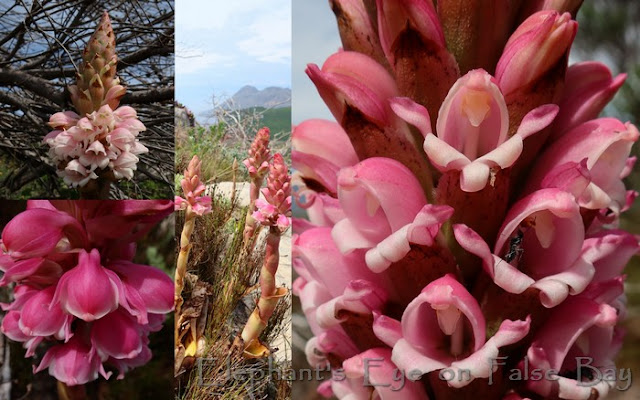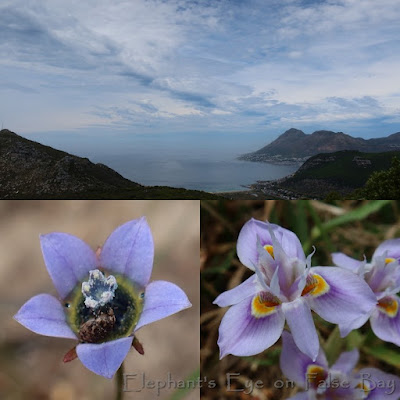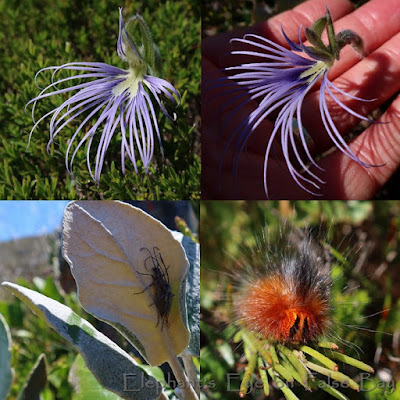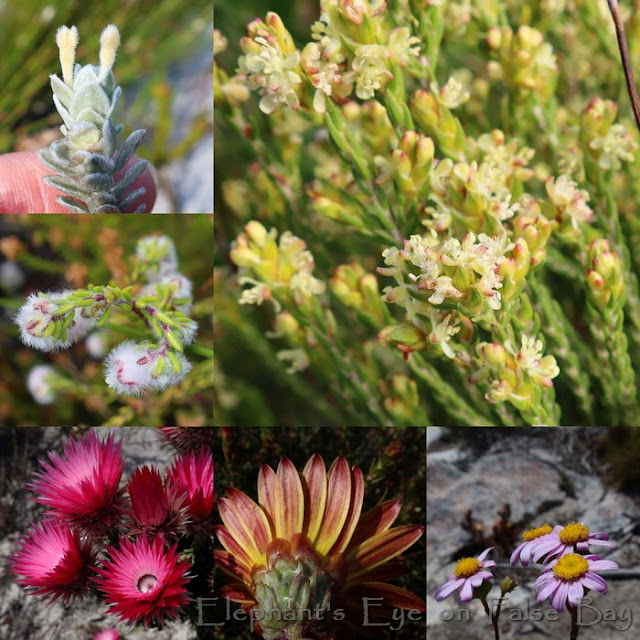October hikes in pink and sky blue
by Diana Studer
- gardening for biodiversity
in Cape Town, South Africa
Hiking among wildflowers
in the mountains
around Cape Town
In October we began at Silvermine circling Spitzkop. Almost back to our cars, we were intrigued by this pool of rich pink flowers. Had to loop off the trail to see what flower? Erica curviflora (very gentle curve to each flower) likes to grow in wetlands, here along the Silvermine River. Having a spectacular year!
 |
| Erica curviflora Silvermine in October |
Tiny white Sebaea aurea and larger yellow with orange dashes Sebaea exacoides. White Gnidia pinifolia (Thymelaeaceae) We found just one dark satyr Satyrium lupulinum!! Erica amoena small bell flares open, in wetlands. Disa bracteata with maroon hood.
 |
| with orchids at Silvermine in October |
Tall white Aristea spiralis. Brown Wachendorfia multiflora. Geissorhiza ovata has red buds. Aspalathus chenopoda has a woolly calyx. Perfect Protea cynaroides bud. Berzelia abrotanoides with its red legs
 |
| with Aristea spiralis at Silvermine in October |
This week's target species at Brakkloofrant is Satyrium carneum. Substantial plants for our orchid family. From blush / shell pink to a rich cherry.
 |
| Satyrium carneum on Brakkloofrant in October |
Big blue sky with painterly clouds. Teensy tiny Wahlenbergia capensis stands tall while Moraea setifolia is trampled underfoot (or would shelter within a mown lawn)
 |
| Big blue sky on Brakkloofrant in October |
One of our 2 fynbos aloes sprawling Aloiampelos commixta. (The second is Aloe succotrina) Cussonia thyrsiflora fruits showing that it is ivy family. Purple Otholobium fruticans. Standard orange Gazania pectinata. Holothrix villosa tiny orchid manages to tuck into pockets on a boulder in the firebreak (just outside a grumpy woman's house - don't tread on my Fynbos!) Sebaea exacoides showing its keeled calyx lobes. Pink Serruria cyanoides. Towering forest of Leucadendron coniferum, after invasive Australian rooikrans wattle was removed and a fire. Protea scolymocephala for my garden wish list.
 |
| October flowers on Brakkloofrant |
Next the Jonkersdam trail for Bartholina burmanniana. Spider orchid for the many legs on the deeply divided lip. Without other eyes to help, I couldn't find one for myself. At teatime I was eye to eye with this pair of longhorn beetles Aristogitus cylindricus. And face to face with mountain white-spot caterpillar Mesocelis monticola
 |
| On the Jonkersdam trail for Bartholina burmanniana in October |
Deep yellow Oedera imbricata (since it doesn't have '9 heads' for capensis). I always sweep from the back on our hikes, gives me time for more photos. We found this patch of golden striped Gazania pectinata. Spiralling up the stem in clusters Manulea rubra. The usual buttery yellow Wachendorfia paniculata. Paired with Pelargonium triste. Polygala bracteolata flowers spread across a 'table'.
 |
| October flowers on the Jonkersdam trail |
Last one was Rooihogte at Cape Point. Gnidia imbricata next to our parked cars, where the park ranger warned us kindly to - Stay on the path, ladies. My nemesis Passerina filiformis (species thanks to botaneek - see below) Furry Erica bruniades likes damp and peaty. Three daisies. Vivid pink with tiny tightly furled leaves Phaenocoma prolifera. Orange striped buds Arctotis angustifolia. Purple Senecio umbellatus
 |
| October flowers at Rooihoogte |
Imagine a winter storm when that great boulder came rumbling down! Yellow Aspalathus capensis. Grasshopper with striped trousers on Lampranthus promontorii. Cordylus niger previously seen in a grim life and death struggle. Syncarpha vestita Cape snow. Laundry blue white opens to a cherry red heart.
 |
| with Cordylus niger at Rooihoogte in October |
Inspired by botaneek's life list on iNat with over 7 thousand species.
I was using iNat for problem children and look what we found! 160 species on my life list. Methodically adding from these October Fynbos Rambles has brought me to 200 Cape Peninsula species. Distant target keep adding (new) month by (old) month towards his almost 500 here? Or cmerry's almost a thousand. And Tony Rebelo with 3K!
Our hikes are listed on my page.
I invite you to join us at Elephant's Eye on False Bay. Please subscribe as you prefer
via Feedly,
or my Facebook blog page
Pictures by Diana Studer
of Elephant's Eye on False Bay
Teal blue text is my links.
To read comments if you are in a Reader,
first click thru to the blog)
Thanks for comments that add value. Your comment will not appear until I've read it. No Google account? Use Anonymous, then please include a link to your own blog. I welcome comments on posts from the last 2 months.

More proof of the incredible beauty and diversity of plants in your part of the world, Diana! I thought you couldn't surpass the splendor of the pink Erica in your first shots but you did again and again throughout this post. All the native orchids are attention-grabbers. I was especially taken with the spider orchid.
ReplyDeleteSlender petals and soft blue, not very tall - made it hard to find!
DeleteYour wildflowers and photos of wildflowers are always so enchanting. That first discovered Erica curviflora is extra special for so many reasons. At the current moment, I'd much rather be in South Africa than Northern U.S. We are gray and dormant and snowless. Maybe some day I'll take a trip your way during our winter gray days.
ReplyDeleteOne day, when COVID has faded to an unpleasant memory.
DeleteWow, just so amazing! You really know your plants, but sounds like you have many more to spot! :-) I can well imagine how the British plant hunters of old felt when they visited southern Africa, like kids in a candy store.
Delete